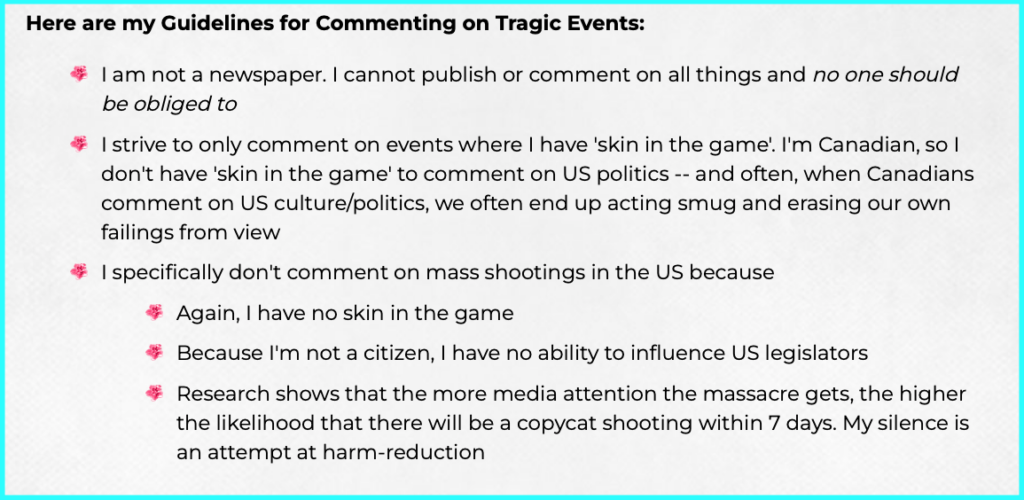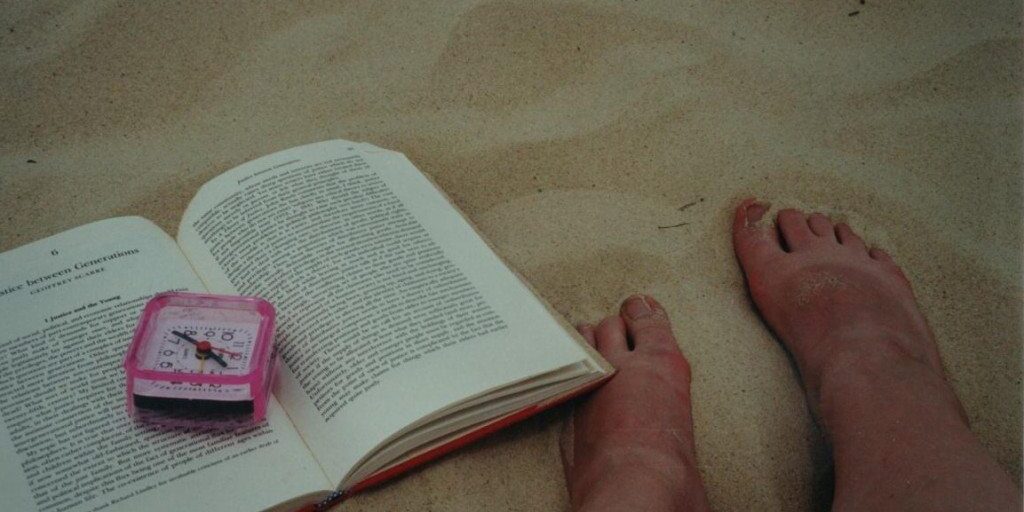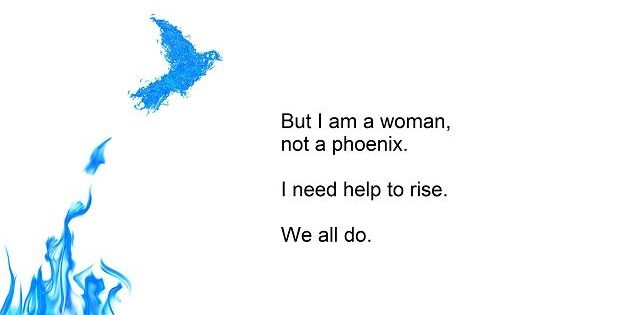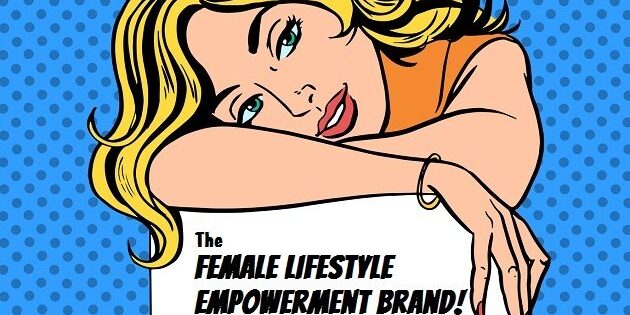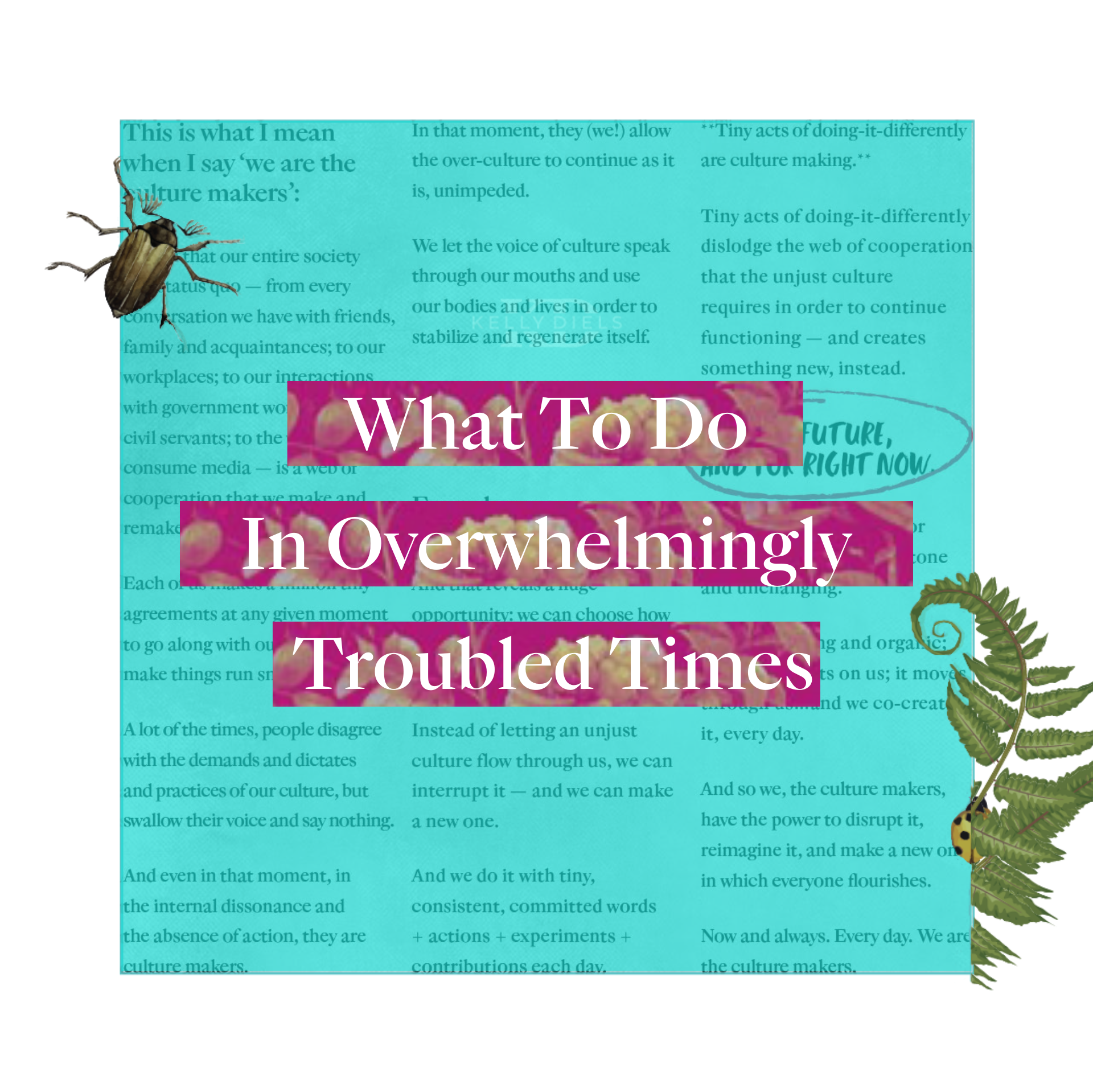
What To Do In Overwhelmingly Troubled Times
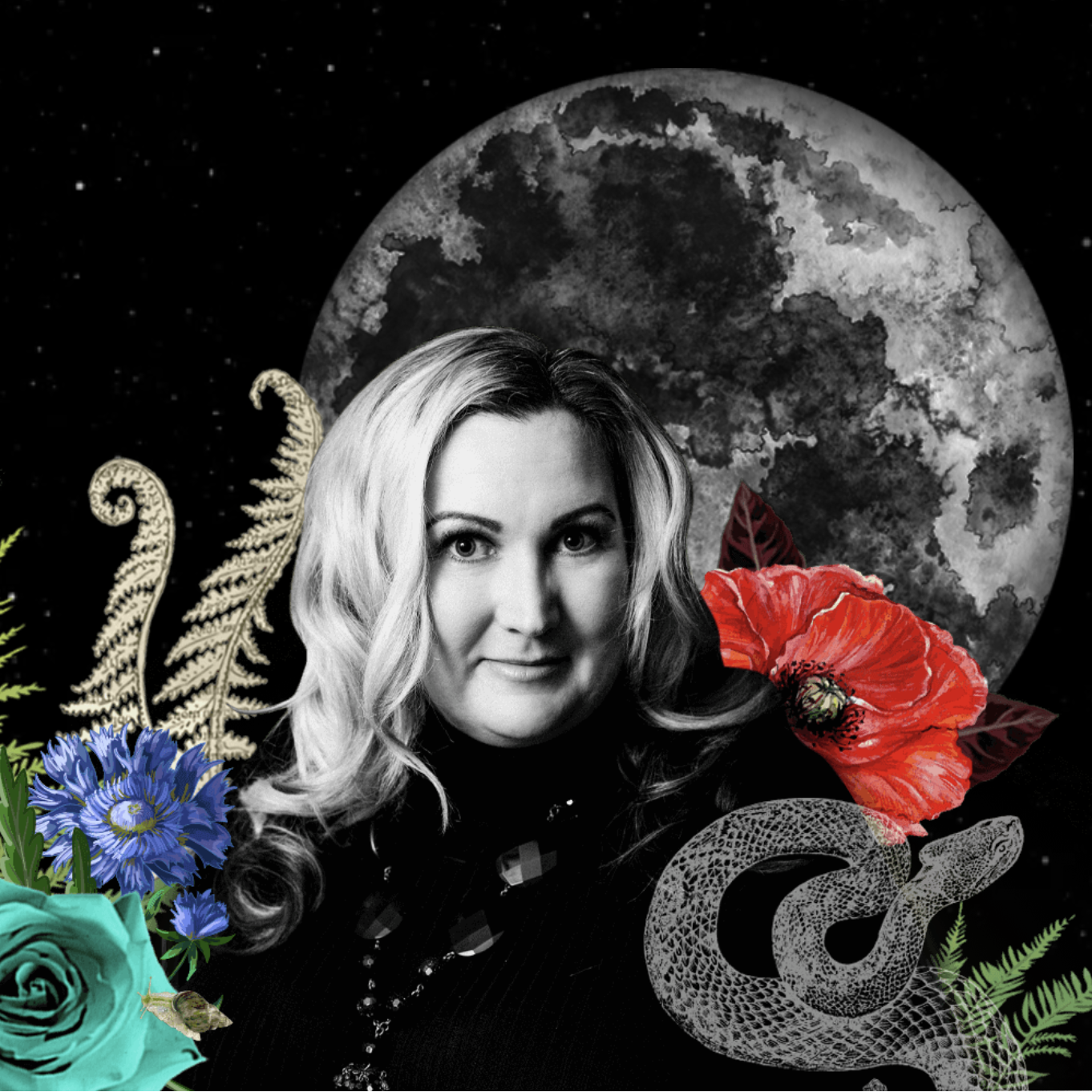
I’ve been sending this email every few months for several years, to rally people when we’re most despairing. The world should NOT be as it is, and we do have the power to change it. Here’s some deeply practical advice about how each of us can do that, even in the midst of the worst.
Dear Culture Maker,
I grew up on Oprah so I believe in using my life.
I believe that we are the culture-makers and we all have the power to change our culture — again, by using our lives.
We use our talents, our gifts, our analysis, the things we know how to do, even our social media platforms and email lists and we contribute them.
So those two things — knowing that I can use what I have and then contributing that — mean that when awful things are going down in the world, I often feel like I’ve got something useful to contribute.
I feel like I can speak up about gendered abuse, for example — a lot of my work speaks to why this is so widespread and how we can stop it. I do feel like I am equipped to pipe up about discourse, manipulation, faux-authority and grift because again, I’m specifically taking that on in my marketing and business-development work. I’ve got something here to contribute.
But mass shootings. Gun violence. Forest fires. Natural disasters. Massacres. War?
These are most definitely not my lane of expertise.
I don’t know how to combat domestic terrorism; I don’t know how to protect rights or challenge legislation in another country; nor do I have a fleshed out real-politik analysis of international events. I don’t know about how to influence politicians in foreign countries and I do not have any connections to organizations on the ground or even a concrete grasp on what people need to terrorism or foreign invasion.
It feels like I don’t feel like I have anything useful to contribute to world crises.
So it’s easy get overwhelmed and think: there’s nothing in my skill-set or analysis that prepares me to contribute.
That makes me feel pretty helpless.
But it doesn’t let me off the hook.
Those feelings — overwhelm, helplessness — are actually really good information and a prompt for action, not inaction.
Instead of getting lost in those feelings, we can learn from them.
These feelings tell me to look for the people and organizations who DO know what to do; who DO have policy positions and analyses and networks and next steps; who DO have influence and leverage and are making things happen…
…and then use what I’ve got to fuel them.
When things are outside our areas of expertise,
that doesn’t mean we’re helpless or useless.
It means we get to work undergirding the work of people & organizations
who ARE serving in exactly this space.
Knowing this gives us an action item to complete: who is doing work that I can support?
To make a difference, let’s ask ourselves this “use your life” foundational question: In my life, what do I have to contribute?
- Sometimes we have volunteer hours
- Sometimes we have money to donate
- Sometimes we have a big platform we can use to raise awareness
- Sometimes we have social media profiles where we can tweet or post and use our influence for good
- Sometimes we have analysis and we can contribute essays and research
- Sometimes we create art that makes a powerful point
- Sometimes we can write press releases
- Sometimes we support people most impacted privately, behind the scenes
- Sometimes we write a Sunday Love Letter to 7,000 people.
Each of us has different gifts and competencies to offer.
- Right now, for example, I’m seeing people in my circles rally behind the scenes to support their family members, colleagues, and people in their communities and programs most impacted
- I’m seeing teachers offer their usual courses or coaches marketing 1:1 sessions and directing the proceeds to humanitarian organizations doing aid work
- I’m seeing people use their therapeutic skills to offer respite to other people suffering and grieving
- I’m seeing people produce videos, reading lists and resources lists for people to get context they didn’t have prior to this moment
- I’m seeing people with leadership philosophies offer teachings to other leaders about how to lead well in a crisis
- I’m seeing people use their platforms and social media to offer context and wise counsel
- I’m seeing people striving to offer perspective or learn from their friends who have different positions than they do in private conversations, not necessarily social media
That’s using your life and leveraging what you’ve got to make a difference.
We don’t have to be senators or ambassadors or world leaders to contribute. We don’t have to have a pre-existing analysis of every issue (no one does), be wildly famous or have huge platforms to contribute.
And that is such a useful model for all of us. Now we’re out of helplessness and into action.
Coming back to a model for how to contribute your life and your gifts…
…even when you feel like you don’t have a pre-established analysis to contribute or a material way to help,
YOU DO.
Here’s a 3-step model for identifying something you can do
(even and ESPECIALLY when you feel overwhelmed and too small to make a difference):
- The feelings of helplessness and overwhelm contain good information. They’re a cue. They tell us to look for people who are already working in this space because they have the knowledge and networks to make things happen.
- So, research the helpers and look for the organizations already doing the work.
- Then look at your talents and competencies and resources (152 followers on Instagram is a resource!) and see what you’ve got that they might most need.
Some practical examples:
- If you’re a caterer, maybe you cater an event that’s raising money for an org you want to support
- If you’re an artist, maybe you take to the canvas and translate your pain into a powerful image
- If you’re a publicist, maybe you publicize their gala
- If you’ve got a workshop or a product, maybe you donate proceeds from your sales to their organization
- If you’re outlandishly famous, maybe you become their ambassador
- If you’ve got a TV show or a podcast, maybe you dedicate some airtime to them
- If you’ve got $10 on your credit card, maybe you send it their way
- If you work at a company, maybe you pass-the-hat or start a lunch-time fundraiser
- If you’ve got a phone, maybe you text the numbers they’re asking you to text
- If you have an elected official representing you, CALL THEM, EMAIL THEM, SEND LETTERS to them
We’ve all got something to offer and it’s when we offer them, one-by-one and en-masse, that we make a difference.
So when you’re feeling overwhelmed and helpless: remember, that’s good information.
It’s a cue for you not to try and take it all on yourself —
instead, look for the people who already know what to do
and use your gifts to lift, amplify and resource their great work.
It’s never on one person, but each of us does have a contribution we can make.
Identify your unique contribution. And offer that. #WeAreTheCultureMakers
love + justice,
Kelly
PS It can also be useful to make some rules and systems for yourself, so that you can fall back on them and know what to do in times of crisis. (I post mine on my website so people can calibrate their nervous systems and expectations.)
I have a rule, for example, about how and when I comment on American events that I am led by, even when emotions are running high.
As a Canadian whose informational frame is dominated by US media & events, the feeling of helplessness can be particularly acute…AND it can lead to smug virtue-signalling, which is NOT helpful.
